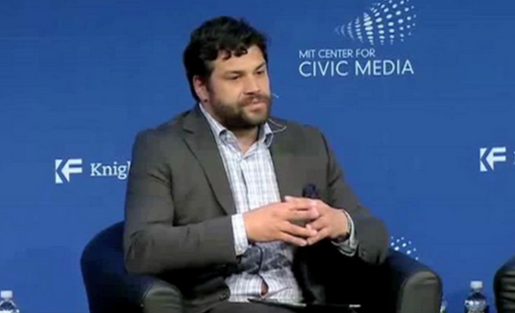On the heels of announcing its most recent slew of News Challenge winners, the Knight Foundation has announced it is funding 24 early stage media projects.

Knight’s Prototype Fund supports small projects with grants of $35,000 each in an effort to push media projects from ideas to actual demos. The fund, which accepts applications on a quarterly basis, is one of several moves by Knight to accelerate innovation in journalism. The foundation also now offers three rounds of its News Challenge instead of one competition per year.
“The Prototype Fund began because of a move by Knight to match its funding more closely to the pace of innovation, while taking advantage of the low cost of experimentation,” Chris Barr, who leads the Knight Prototype Fund, said in a statement.
This round of Prototype Fund winners focused on human-centered design. Nine of the projects took part in the most recent News Challenge round, which was centered on health data.
Meet the winners
Aretfact Group: Advancing civic engagement by creating a Web-based deliberation tool that uses design strategies to promote problem solving and drive consensus among a group of diverse strangers.
Argos: Making news content easy to digest by building a design-driven news platform that aggregates and analyzes news stories and creates concise news backgrounders, including insights and connections regarding specific stories.
Bocoup: Conducting a survey and creating a guide identifying patterns and best practices for mobile data visualization.
Brown Bag Software: Revealing the challenges and constraints of building mass transit by creating a simulation app that allows the public to build model transit and land-use programs to better understand basic design and operational constraints.
CCTV Center for Media & Democracy: Using the Burlington, Vt., public gigabit network, in collaboration with the Code for BTV Code for America Brigade, to make cloud computing resources available for community-driven software applications that range from live interactive video of public meetings to civic apps that solve pressing community issues.
Civic Ninjas: Creating an application to help the public identify and visualize meaningful local health data through an accessible, fun interface inspired by Sunlight Foundation’s Sitegeist.
Data Driven Detroit: Informing the public and addressing important community issues by developing an interactive tool that helps Detroit residents discover and use relevant data about their city.
Farmers Market Coalition: Providing farmers markets with a Web application to easily and effectively collect, store and report data about the health impacts of their markets.
Fathom: Making complex zoning data accessible and actionable for the public by creating a website that will visualize details of Boston’s new rezoning ordinance for urban farming.
Forest Giant and Urban Design Studio: Creating LouLoops, a mobile app that maps bike routes and collects data so that local officials can officially plan infrastructure projects.
Global Sensor Web: Helping scientists and citizens collaborate and better monitor their environment through an online platform for aggregating geo-tagged data sets from public data sources and the onboard sensors of mobile phones.
Habitat Map: Empowering youth to help measure air quality and collect data by developing the next version of Kids Making Sense, a complete measurement sensing system and curriculum.
Keepr: Creating an open source data-mining tool for journalists to track breaking news stories, so they can easily find quality news sources.
Moneca Core: Making it easier to capture community-generated news by creating an open source code library to capture multimedia content by citizen journalists in mobile apps.
!nstant: Building a mobile app designed to verify and provide context to breaking news on social media so that the public is given a more accurate and clear picture of news stories.
One Degree: Helping people find community resources by developing a Web app that allows users to discover, track and share their experiences about social services.
Restatement: Making legal information more accessible by producing a design-driven system for the creation and parsing of machine-readable legal text.
Sexual Health Innovations: Providing up-to-date STD data by building an API to allow easy sharing of aggregate STD test data among clinics, health departments and the Centers for Disease Control to inform communities and help organizations mobilize resources to those in need.
Silent Spring Institute: Making data easier to understand by creating data visualizations of environmental health indicators that include multi-sensory, immersive and aesthetic interactions (example: mapping an individual’s chemical exposure data onto their clothing).
Smart Chicago Collaborative: Using Twitter to identify potential cases of food poisoning in Chicago and encouraging individuals to report incidents of food poisoning.
The Center for Rural Strategies: Testing an approach to generate data-driven, localized news stories that media and other organizations in rural U.S. counties can use.
University of Missouri: Developing a system to collect and report noise data to better track problems of noise pollution in Columbia, Mo., that will be informed by community hacking events and prototype tests.
Vizzuality: Building an open source tool that allows journalists and other users to quickly turn data, maps and other content into interactive stories for online publication.
Zago: Seeking to make newsrooms more efficient by building a mobile app that will allow secure data sharing between reporters and their newsrooms.
Stay tuned for more information on the winners. You’ll be able to read more about some of the projects here on Idea Lab.
Desiree Everts is the associate editor for Idea Lab and PBS MediaShift. She’s dabbled in digital media for the past decade including stints at CNET News and Wired magazine.

